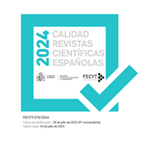Women as linguistic codifiers in modern Europe. A comparative socio-historical British and Spanish framework
Resumen
Considering the role of grammars as cultural products, influential on the education of women and children of the past, this contribution aims at assessing the extent to which nineteenth-century Spanish women were allowed to enter a community of discourse constituted by grammarians and linguistic codifiers of the vernacular. Following socio-historical lines of study, this new path of exploration intends to give visibility to women as authors and receivers of grammatical discourse and to provide comparative material to previous research in the field, particularly that on eighteenth-century British women grammarians. First, school grammars of the eighteenth and nineteenth centuries are reanalysed from the point of view of ideological discourse. British female grammarians and their audiences are then taken into consideration in order to establish a social and historical framework which may serve as a basis for comparison. The Spanish setting is described and conjectured profiles of women as authors and receivers of grammar-books are given. Finally, a preliminary list of names and works is provided, laying the base for future research.Descargas
Descarga artículo
Licencia
La revista Círculo de Lingüística Aplicada a la Comunicación, para fomentar el intercambio global del conocimiento, facilita el acceso sin restricciones a sus contenidos desde el momento de su publicación en la presente edición electrónica, y por eso es una revista de acceso abierto. Los originales publicados en esta revista son propiedad de la Universidad Complutense de Madrid y es obligatorio citar su procedencia en cualquier reproducción total o parcial. Todos los contenidos se distribuyen bajo una licencia de uso y distribución Creative Commons Reconocimiento 4.0 (CC BY 4.0). Esta circunstancia ha de hacerse constar expresamente de esta forma cuando sea necesario. Puede consultar la versión informativa y el texto legal de la licencia.











